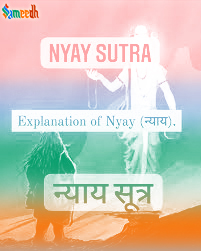The Nyay Sutras, also known as the Nyay Darshan, are foundational texts of the Nyay school of Indian philosophy. They were composed by the ancient Indian philosopher Gautam, also known as Akṣapād Gautam, around the 2nd century BCE. These sutras are written in the Sanskrit language and serve as a systematic exposition of Nyay philosophy.

In Hinduism, the Nyay Sutras refer to the foundational text of the Nyay school of Indian philosophy. The Nyay school is one of the six classical schools of Hindu philosophy, known as the Shad-Darshanas. These schools aim to understand the nature of reality, the self, and the means to attain liberation (moksh) through different philosophical perspectives.
The Nyay Sutras are attributed to the ancient sage Gautam, also known as Akṣapād Gautam. They are composed in the form of aphorisms (sutras) and serve as a systematic exposition of Nyay philosophy. The Nyay Sutras primarily focus on logic, epistemology, and methodology, providing a framework for rational inquiry and debate.
The Nyay Sutras consist of five chapters, each dealing with different aspects of Nyay thought:
- Pramāṇa: This chapter deals with epistemology and discusses the means of valid knowledge. It explores various sources of knowledge such as perception, inference, comparison, testimony, and postulation.
- Prameya: This chapter discusses the objects of valid knowledge. It explores different categories of objects that can be known, including substances, qualities, actions, universals, and particularities.
- Saṁśaya: This chapter discusses doubt and aims to provide methods for resolving doubts through valid means of knowledge.
- Prayojana: This chapter focuses on the purpose of knowledge and discusses the goals or aims that humans seek to achieve through the pursuit of knowledge.
The Nyay school is known for its emphasis on logical rigor, argumentation, and systematic analysis. It has significantly contributed to the development of Indian philosophical thought, particularly in the realms of epistemology and logic.